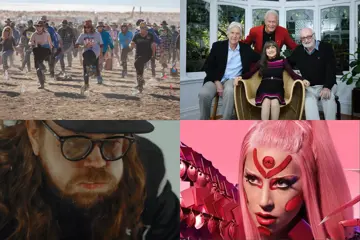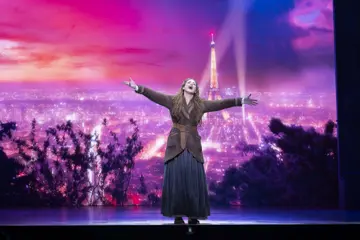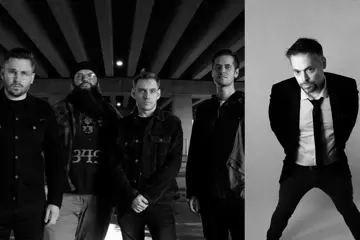WARCRAFT: THE BEGINNING

Given Warcraft: The Beginning is a cynical IP-monetisation built on uncanny-valley-dwelling CGI and hokey high-fantasy tropes, it’s hard to call even a moment of it ‘exciting’. However, if we must, the most exciting bit of Warcraft: The Beginning is when an Orc mother bids adieu to her newborn son — whose green cock we’ve already copped an eyeful of — by laying his basket in the reeds, sending him on a fateful journey downriver in search of future sequels. It’s not just (mildly, barely) exciting because it so shamelessly steals from the bible (ewwww), but because, for one moment, my critical brain was actually engaged.
Like: if this Orc baby is a symbolic Moses, this means that the Orcs are the Hebrews? And they’ll soon be enslaved by the Humans; who’re, I guess, the Egyptians? But the Orcs themselves keep Elves enslaved, meaning the Elves are, what, modern-day Palestinians? So, the bellicose, occupationist Orcs are actually not the ancient Israelites, but the Israeli state? Are they both at once?
Is this Warcraft movie — like David Mitchell’s genre-hopping literary adventure in nesting narratives, Cloud Atlas (its own to-screen translation also a CGI-filled/uncanny-valley-dwelling movie of lamentable cinematic quality) — a portrait of predacity; a parable on the way societies are, across cultures and centuries, a constant cycle of oppression, with the strong subjugating the weak, and uprisings just merely introducing a new ruling class? Is this Warcraft movie a simultaneous study of Biblical and contemporary Middle Eastern conflict as dramaturgical ouroboros? Is time a flat circle?
Don't miss a beat with our FREE daily newsletter
They’re interesting thoughts to have, because Warcraft has so few of its own. “To an Orc, war is always the answer,” says some Orc at some point, paraphrasing the parable about a hammer’s perspective on nails; this propensity for predacity perhaps explaining the evolutionary imperative that has let Orcs grow to be steroidal green monsters, their gamer-fantasy-fulfilment muscles seemingly requiring too much fuel and impractically oversized. And, thus, this maxim explains why the whole film involves creatures either killing or being killed, fighting in battle or planning battles. To Warcraft, every scene is a war scene. Even when it’s inter-species flirtation between green-faced Paula Patton, who plays a sexy half-blood lady-Orc in Leia slave-girl cosplay and Rainbow Serpent dreads, and bearded/bogan/white-bro hero Travis Fimmel.
Speaking of white-bro-heroism: screenwriter Charles Leavitt once penned Blood Diamond, the ne plus ultra of culturally-offensive White Knight/Caucasian Saviour movies. Here, he and director Duncan ‘David Bowie’s son (and also the guy who made Moon)’ Jones don’t just raid the bible, but liberally pillage Lord Of The Rings, cobbling together an entire script — an entire world! No, wait, two worlds! — from cod-mystical Tolkienist clichés.
Warcraft is set in some medieval-esque realm of English accents, horse-drawn carriages, sturdy steeds, armour, broadswords, castles, spiral staircases, mead drunk from tankards, men saying “sire”, and allegiances between various clans all existing under systems of top-down monarchical/dictatorial rule. People — or Orcs, or Elves — are locked in dungeons, capture slaves, ransack villages, cast spells, fly on griffins and ride on big cats, and make rendezvous plans like “meet at the black rock when the sun is highest”. Everyone has fantasy-wonk names (Fimmel’s character is called Sir Anduin Lothar!), and are either privileged royalty or nameless grunts soon to be murdered. If you like scenes where two armour-clad CGI armies run at each other whilst yelling, then giddy up.
"There’s an endless procession of he-gave-his-own-life-for-the-greater-good sacrifices, the dramatic weight of each measured by just how slow the ultra-slow-motion is when they tragically fall to the ground..."
Those armies are, chiefly, Humans and Orcs; the latter an invading horde entering Earth through a crypto-vaginal wormhole-space-mirror sparked into life by green Tron lines. The Orc leader wears a shadowy hood and speaks in a guttural sneer and literally sucks the life from any helpless peon that crosses his path, so, y’know, he’s bad. The Orcs need to invade Earth because their own planet has been turned into a scorched wasteland by said bad-guy’s non-specific dark-magic evil, which’d be a great contemporary-Earth hyper-capitalist/environmental allegory, except said villain (Gul’dan!) is actually blazing this rampaging trail of destruction, death, and dastardly double-crossings all just so his minions’ll build him a ridiculously-large, Bender-as-pharaoh-esque statue.
Which, wait, makes the Orcs the Ancient Egyptians? And the noble, more-peaceful caste of Orcs — whose skin is a lighter shade of green! — the Israelites? And the humans are the Romans? So, Fimmel is Antony? And Patton is Cleopatra? And time is a pointy pyramid?
The invading Orcs like killing people, natch, and so humanity must get the Dwarves — a subjugated race of Scots who toil in a giant smelter literally named Ironforge — to make a rush order of “boomsticks” (Fuzzy Lumpkins ahoy!). And, they must also recruit Ben Foster, whose ginger-bearded, mystical-bullshit-spouting, lightning-bolt-zapping Grand, um, Wizard looks like a cross between beefcake Jesus and Jeff Rosso, and whose magic serves as convenient deus-ex-machina device in every battle. There’s also some young sorcerer’s apprentice who was kicked out of floating-castle-in-the-sky wizarding school, and an army dude whose pops — Fimm-dogg! — has never told him he loves him.
The only way this kid can win approval from his disapproving dad is to die on the field of battle. And, if you like films featuring heroic battlefield deaths, then giddy up with an extra pair of underwear. Here, there’s an endless procession of he-gave-his-own-life-for-the-greater-good sacrifices, the dramatic weight of each measured by just how slow the ultra-slow-motion is when they tragically fall to the ground, the profundity measured by how nobly they can comport themselves — or even deliver poignant words! — with their final breaths.
Strings swell, timpanis pound, a cameo-ing Glenn Close materialises as a black-cloaked vape-smoke wraith prophesying the final battle, Foster grows horns out of his chin when dark forces get him all Gollumy, and his fashioned golem (wait, humans are the Hebrews, now?) turns into the monster from the end of Batman v Superman, leaps into the wiz’s majickal electro-jacuzzi and tries to kill everyone. Then there’s some more battles, some Thunderdomey man-on-Orc showdowns, and talk of the “honour” of killing when done in certain ritualistic fashion.
And, then, lo, once it’s seemingly ended, there’s the Moses Orc baby floating down the river, into the hands of humans, ready to grow up into a mighty uprising-starting warrior by the next film. That sequels are being so openly mooted is hardly a surprise: the dream of a money-making Warcraft cinema franchise is transparently writ after this film’s titular colon. But, when confronted with an initial instalment this shitty, you can only hope that The Beginning marks The End.















